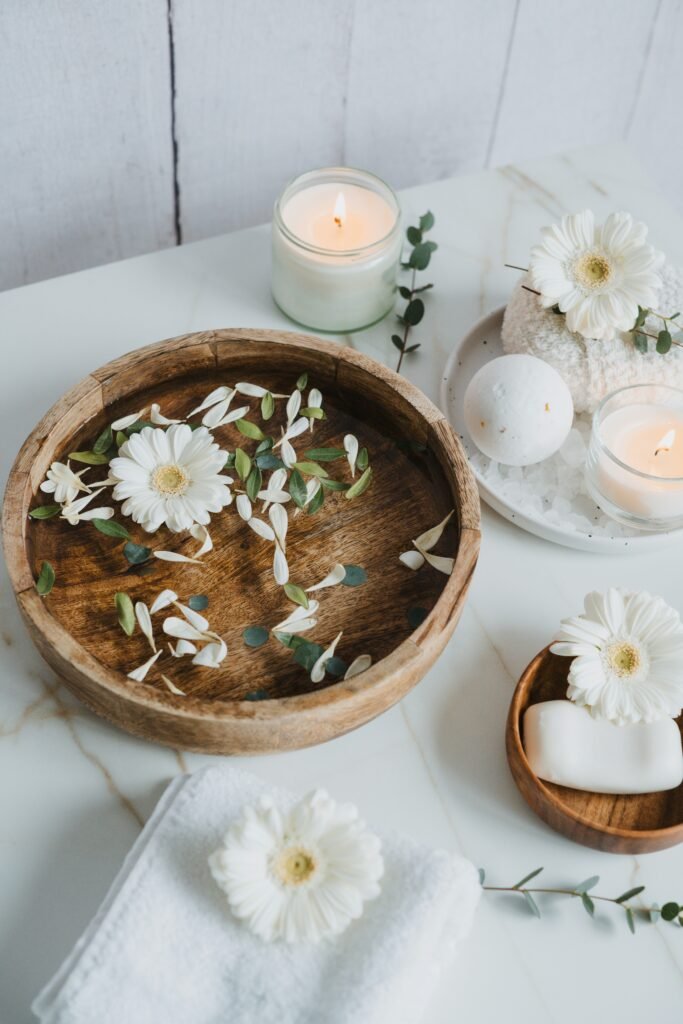Simple Self-Care Rituals That Help Me Feel Like Me
Why I Had to Rethink “Self-Care”
If you’d asked me a few years ago what self-care meant, I probably would have rattled off something like facials, spa days, or a weekend getaway. Don’t get me wrong, those things are lovely—but when you’re juggling work, kids, and the everyday chaos of life, they aren’t exactly realistic. What I really needed wasn’t a once-in-a-while luxury, but tiny, everyday rituals that made me feel human again.
I learned this the hard way. One rainy Tuesday, I was running on empty, staring at my reflection and barely recognizing myself. Instead of grabbing yet another coffee, I stopped. I made a cup of tea, held it with both hands, and just breathed. It sounds ridiculously simple, but that pause changed something in me. It was the start of building little rituals that help me reconnect with myself every single day.

The Beauty of Small Rituals
The thing about these rituals is—they’re not glamorous. They won’t show up on Instagram, and they don’t require expensive products. They’re quick, repeatable, and flexible enough to squeeze into even the busiest schedule. And that’s their magic.
Instead of chasing a perfect morning routine or following someone else’s checklist, I discovered that the simplest actions—breathing, stretching, writing a few words—could anchor me better than any complicated “wellness trend.”
Self-care, at least for me, stopped being about escaping life and started being about living it more fully. These practices became little reminders: You’re more than your to-do list. You’re still here. You still matter.
What My Family Thinks About It
Funny enough, my family noticed the shift before I did. After a few weeks of sticking to my tiny rituals, my husband looked at me one evening and said, “You’re back.” I hadn’t realized how much of myself I’d lost in the shuffle until I started to feel calmer, lighter, and more present.
My teenage daughter used to tease me about “Mom’s weird tea time,” but now I’ll catch her in the same chair by the window, sipping her own tea in silence. My son will whisper, “Shhh, Mom’s doing her breathing thing,” when I sneak in five minutes of meditation. What started as my private reset has become part of our family rhythm. They protect those moments for me because they’ve seen what a difference it makes.
Why These Rituals Actually Work
So, why do these little things matter so much? It’s partly science and partly soul.
- Science first: Taking just a few minutes to slow down shifts your body from stress mode into rest mode. Your heart rate slows, your cortisol levels drop, and your brain gets the message: you’re safe.
- On a deeper level: They remind you that you’re more than your roles—parent, partner, employee. These pauses bring you back to yourself, to that quieter part that gets drowned out in the noise of daily life.
It’s not about doing everything perfectly or following a strict plan. It’s about finding those simple actions that ground you and repeating them often enough that they become second nature.
My Go-To Self-Care Rituals
Here’s what works for me (and maybe a few will inspire you to try your own):
- Tea Meditation: Every morning, I make tea and actually drink it slowly. No scrolling, no multitasking. Just me, the steam, and silence.
- Five-Minute Breathing: One hand on my chest, one on my belly, breathing deeply before the day takes over. It resets my mood instantly.
- Gratitude Journal: At night, I jot down three little things I’m grateful for—like the way the light hit the kitchen table or my daughter’s laugh. Small details, big impact.
- Mini Stretch Breaks: A quick stretch—arms overhead, gentle twist, fold forward—when I feel tension building. It reminds me I have a body, not just a brain.
- Nature Moments: A short walk, a glance out the window, or even watering a plant. Nature has a way of calming the noise inside me.
How to Make Rituals Stick
If you’re anything like me, you’ve probably tried a dozen routines that fizzled out after a week. Here’s what I’ve learned about making rituals sustainable:
- Keep it tiny. Two minutes is better than nothing. Small and consistent beats big and inconsistent.
- Stack it with something you already do. I breathe while the kettle boils. I write in my journal right before bed. Linking habits to existing ones makes them easier to remember.
- Use your senses. Smell your tea, feel the blanket, listen to calming music. Engaging multiple senses helps anchor you in the moment.
- Don’t beat yourself up. Missed a day? Who cares. Start again tomorrow. Self-care isn’t another thing to be perfect at.
Switching Things Up
Not every ritual works for everyone, and even the ones you love may not fit every season of your life. Here are some variations:
- Too busy in the morning? Try a midday reset at your desk.
- Hate journaling? Take “mental snapshots” of moments you want to remember.
- Struggle with stillness? Try mindful movement—stretching, walking, even washing dishes slowly.
- Love tech? Use a short guided meditation app. Hate tech? Go screen-free for your rituals.
The point isn’t to copy what works for someone else—it’s to notice what makes you feel more like yourself.
The Healthier Side of Self-Care
Here’s the thing: not all self-care is created equal. Scrolling TikTok for an hour feels like a break, but it rarely leaves me feeling better. The rituals that truly help are the ones that nourish me instead of just distracting me.
That might mean:
- Saying “no” more often.
- Putting my phone in another room.
- Choosing quiet over constant stimulation.
- Or simply allowing myself to rest without guilt.
Real self-care isn’t indulgent—it’s essential. It’s what lets you show up for your life without running on empty.
Closing Thoughts: Coming Back to Yourself
If there’s one thing I’ve learned, it’s that self-care doesn’t have to be elaborate to be powerful. It’s not about perfection or Instagram-worthy rituals. It’s about those small, repeatable actions that bring you back to yourself.
Some days my rituals are neat and intentional; other days they’re messy and rushed. But they always remind me: I am more than the chaos around me. And honestly, that reminder is priceless.

Frequently Asked Questions About Simple Self-Care Rituals
1. How long should I practice these self-care rituals before expecting results?
Many people notice immediate benefits in terms of reduced stress or improved mood, but the deeper transformation typically emerges after 2-3 weeks of consistent practice.
2. What if I don’t have time for self-care rituals?
Start with “micro-rituals” that take 60 seconds or less. Even brief moments of intentional self-connection can interrupt stress patterns and build over time.
3. Are these self-care rituals evidence-based?
Yes, many simple practices like mindful breathing, gratitude journaling, and brief meditation have substantial research supporting their effectiveness for stress reduction and improved wellbeing.
4. How do I know which self-care rituals will work for me?
Experiment with different practices and notice how you feel afterward. The most effective rituals will leave you feeling more centered, calm, and connected to yourself.
5. Can self-care rituals help with anxiety or depression?
While these practices can be supportive complementary approaches, they should not replace professional treatment for clinical anxiety or depression. Consider them additions to, not substitutes for, appropriate mental healthcare.
6. What’s the difference between self-care and self-indulgence?
True self-care nourishes and sustains you long-term, while self-indulgence may provide temporary pleasure but doesn’t necessarily support your overall wellbeing.
7. How can I remember to do my self-care rituals consistently?
Link them to existing habits (like morning coffee or brushing teeth) or set gentle reminders until they become automatic parts of your routine.
8. What if my family doesn’t respect my self-care time?
Have clear conversations about why this time matters for everyone’s benefit. Start with very short practices and gradually extend as family members adjust to this new boundary.
9. Can children benefit from self-care rituals too?
Absolutely! Simple rituals like deep breathing, gratitude sharing, or calming sensory activities can help children develop emotional regulation skills and healthy self-awareness.
10. How do I avoid feeling guilty about taking time for self-care?
Reframe self-care as essential maintenance rather than luxury. Just as you wouldn’t feel guilty for charging your phone, you shouldn’t feel guilty for recharging yourself.
11. Can self-care rituals improve my relationships?
Yes – when you’re connected to yourself and regulated emotionally, you can show up more fully and authentically in your relationships with others.
12. What if I try a popular self-care ritual and it doesn’t work for me?
That’s completely normal and expected. Self-care is deeply personal – what works for someone else might not resonate with you. Keep experimenting until you find practices that genuinely help you feel like yourself again.

